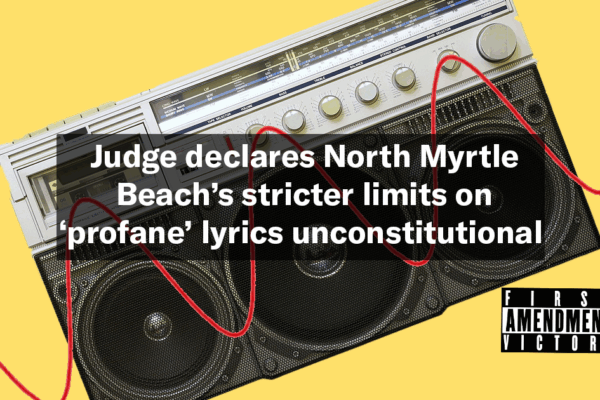In a win for free speech, a federal judge has ordered the City of North Myrtle Beach to stop enforcing its unconstitutional restriction on amplified music with “profane” lyrics.
The law in question, Ordinance 21-33, makes it a misdemeanor to broadcast “obscene, profane or vulgar language” above certain volumes at certain times of day: no higher than 30 decibels during the day and no higher than 50 decibels after 11 p.m. For reference, 30dB is is roughly equivalent to a whisper, or the noise produced by rustling leaves.
This ruling in our client’s case, Moshoures v. North Myrtle Beach, echoes what we at the ACLU of South Carolina told North Myrtle Beach officials in an October 2021 letter. Shortly after the city enacted Ordinance 21-33, but before filing the lawsuit, we wrote to the mayor and city council to warn them: This is an unconstitutionally vague, content-based speech restriction that runs afoul of the First Amendment.
“Beyond North Myrtle Beach’s interest in honoring its citizens’ constitutional rights, passing an unconstitutional ordinance is also ill-advised because it exposes the City to the imminent threat of litigation,” ACLU-SC Legal Director Allen Chaney wrote in the letter dated October 7, 2021. “I am aware of your desire to retain North Myrtle Beach’s reputation as a ‘family beach,’ but you cannot use unconstitutional means to achieve that end. Please consider rejecting this new law.”
We took this case to uphold the basic tenets of free speech protections. We took it because in this area, as in so many areas of law, we had real concerns about discriminatory enforcement of an overly vague law.
We also took this case to prove a point to other municipalities across South Carolina: When we give you a warning about unconstitutional lawmaking, you should take heed.
“Ultimately, the ruling confirmed what we said in our 2021 letter: that North Myrtle Beach cannot restrict speech just because the City doesn’t like it,” said ACLU-SC Staff Attorney Meredith McPhail.
In his March 13 order, U.S. District Judge Joseph Dawson III declares that the City of North Myrtle Beach must cease enforcing its prohibition on loud music with “profane” language. Other parts of the ordinance restricting “obscene” and “vulgar” language may be enforced for now, so long as the restricted speech falls within the extremely narrow definition of "obscene" set by Supreme Court precedent.
For more information about this case, including the original letter to North Myrtle Beach officials, the initial complaint, and this month’s ruling, visit the Moshoures v. North Myrtle Beach case page.
Stay Informed
Sign up to be the first to hear about how to take action.
By completing this form, I agree to receive occasional emails per the terms of the ACLU’s privacy statement.
By completing this form, I agree to receive occasional emails per the terms of the ACLU’s privacy statement.

